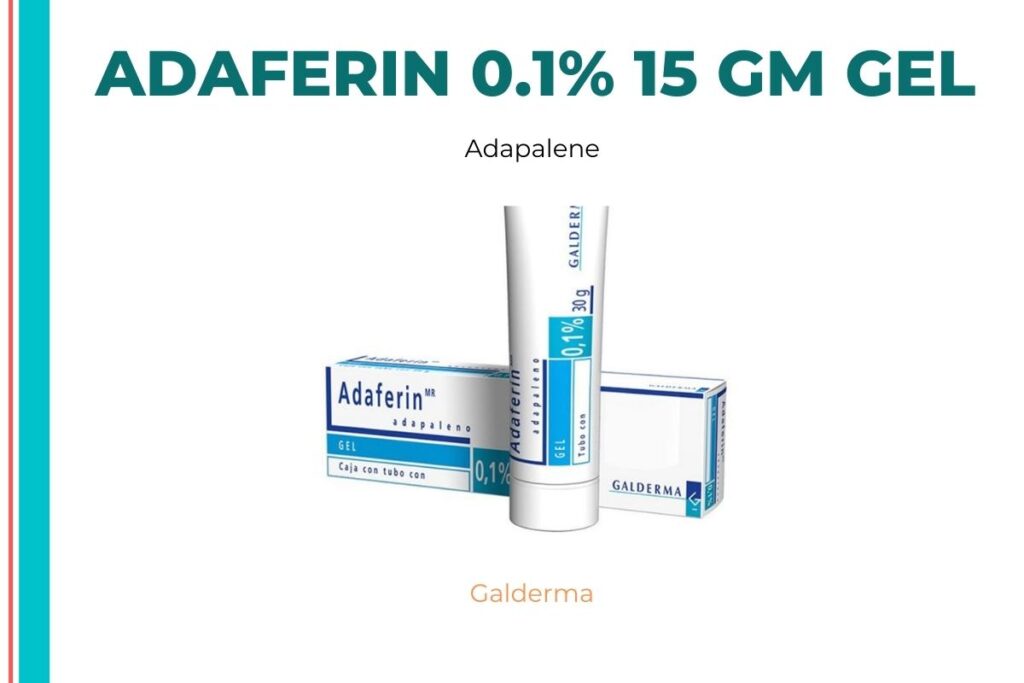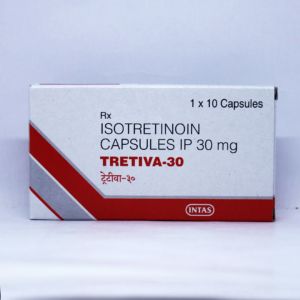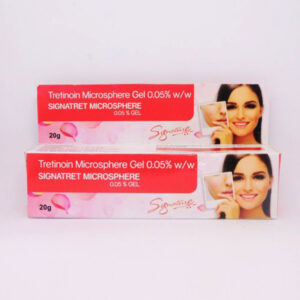Adaferin Gel 15 gm
Adaferin Gel 15 gm belongs to the ‘antiacne’ class of dermatological preparations used to treat acne (pimples) in people aged 12 and up. Acne is a common skin disorder that occurs when dead skin cells and oil clog hair follicles. The bacterium that causes acne feeds on sebum (the natural oil generated by the skin), producing inflammation and redness.
Adapalene is a kind of retinoid that is found in Adaferin Gel 15 gm (human-made vitamin A). It works by relaxing the cells on the skin’s surface and unblocking pores by lowering the skin’s oil production. As a result, pimples, whiteheads, and blackheads are reduced.
Adaferin Gel 15 gm is intended for external usage only and should only be applied to the skin’s surface. Using your fingertips, apply a tiny amount of Adaferin Gel 15 gm in a thin layer to the clean and dry affected region. Adaferin Gel 15 gm should not be applied to the nose, ears, mouth, or eyes. If Adaferin Gel 15 gm comes into touch with these locations by accident, thoroughly rinse with warm water. Based on your medical situation, your doctor will tell you how often you should take Adaferin Gel 15 gm. In some situations, you may suffer dry skin, irritation, redness, or a burning sensation on your skin. The majority of these Adaferin Gel 15 gm side effects do not require medical care and will go away over time. Please visit your doctor if the side effects persist or worsen.
Please inform your doctor if you are allergic to Adaferin Gel 15 gm or any other medications. Cuts, open wounds, scrapes, sunburned, windburned, chapped, dry, or irritated skin should not be treated with Adaferin Gel 15 gm. While taking Adaferin Gel 15 gm, avoid exposure to tanning beds or sunlight, as it may make the skin more sensitive to sunlight and cause sunburn. When going outside, use protective gear and apply sunscreen to avoid becoming sunburned. Please consult your doctor before using Adaferin Gel 15 gm if you are pregnant or breastfeeding. Adaferin Gel 15 gm should not be applied in excessive amounts or for longer than recommended because it does not provide faster or better results and raises the risk of adverse effects such as irritation, scaling, or redness of the skin. Before using Adaferin Gel 15 gm, tell your doctor if you have eczema (itchy, puffy, rough, and cracked skin) or burnt skin.
Adaferin Gel 15 gm Acne Treatment (pimples)

Medicinal Advantages
Adapalene (man-made vitamin A) is present in Adaferin Gel 15 gm, which is used to treat acne (pimples). By lowering the production of oil in the skin, Adaferin Gel 15 gm loosens the cells on the skin’s surface and unblocks pores. As a result, pimples, spots, whiteheads, and blackheads are reduced. Adaferin Gel 15 gm also promotes the growth of new skin cells and aids in natural exfoliation (the elimination of dead skin cells) of the skin’s outer layers. Adaferin Gel 15 gm relieves inflammation and pain by acting as an anti-inflammatory.
Use Instructions
Before and after applying Adaferin Gel 15 gm, wash your hands. Wash the afflicted area with water before using it. Apply a thin layer of Adaferin Gel 15 gm to the clean and dry afflicted area of the skin before retiring to bed. Adaferin Gel 15 gm should only be used externally. If you’re using Adaferin Gel 15 gm on your face, keep it away from your eyes because it can irritate them. If Adaferin Gel 15 gm comes into contact with your eyes, rinse them well with water.
Store in a cool, dry location away from direct sunlight.
Adaferin Gel 15 gm Side Effects
Skin that is parched
Inflammation of the skin
Redness of the skin
Skin that feels like it’s on fire
Desquamation is a term used to describe the process of (skin peeling)
Pruritis is a type of pruritis that (intense itchiness of the skin)
Sunburn
Drug Recommendations
Please inform your doctor if you are allergic to Adapalene or any other medications. Cuts, open wounds, scrapes, sunburned, windburned, chapped, dry, or irritated skin should not be treated with Adapalene. Adapalene should not come into contact with your nose, ears, mouth, or eyes. If Adapalene comes into contact with these places by accident, thoroughly rinse with warm water. While using Adapalene, avoid tanning beds or direct sunlight because it may make your skin more susceptible to the sun and cause sunburn. When going outside, use protective gear and apply sunscreen to avoid becoming sunburned. Please with your doctor before using Adapalene if you are pregnant or breastfeeding. Adapalene should not be used in excessive doses or for longer than recommended because it does not provide faster or better outcomes and instead raises the risk of adverse effects such as irritation, scaling, or redness of the skin. Before taking Adapalene, tell your doctor if you have eczema (itchy, puffy, rough, and cracked skin) or burnt skin.
Interactions Between Drugs
Adapalene may interact with retinoids (isotretinoin), photosensitizing agents (aminolevulinic acid, methoxsalen, porfirmer, verteporfin), sensitizer (methyl aminolevulinate), keratolytic agents (benzoyl peroxide, salicylic acid, sulfur), antiseptics, and other vitamin A-related medications (resorcinol).
No drug-food interactions have been discovered.
If you have eczema (itchy, puffy, rough, and cracked skin) or burnt skin, tell your doctor before taking Adapalene.
Safety Suggestions
ALCOHOL
Adapalene’s effect with alcohol is unknown. Before drinking alcohol while taking Adapalene, talk to your doctor.
PREGNANCY
Adapalene is a pregnancy category C medication that is normally avoided by pregnant women. If you are pregnant, please seek medical advice.
BREAST FEEDING
Adapalene is not known to be excreted in human milk. As a result, Adapalene is only given to breastfeeding moms if the doctor believes the benefits outweigh the risks. To avoid Adapalene coming into contact with the baby, do not apply it to the chest area.
DRIVING
ADAPANE DOES NOT AFFECT YOUR ABILITY TO DRIVE OR OPERATE MACHINERY Adapalene normally has no effect on your ability to drive or operate machinery.
LIVER
Please visit a doctor if you have any concerns about the usage of Adapalene in patients with liver disorders.
KIDNEY
Please visit a doctor if you have any concerns about the usage of Adapalene in people with kidney problems.
No habit formation
Advice on Diet and Lifestyle
Adapalene may make the skin more susceptible to sunlight and cause sunburn, therefore avoid sun exposure when using it. When going outside, use protective gear and apply sunscreen to avoid becoming sunburned.
Regular exercise can help you feel better about yourself and boost your mood, but it won’t cure acne. Shower as soon as you finish your workout since sweat can worsen acne.
Wash your hair on a regular basis to prevent hair from falling across your face.
Before going to bed, remove all of your make-up.
Avoid strong soaps, skin cleansers, shampoos, hair removers or waxes, hair coloring or permanent chemicals, detergents, and rough textiles that might irritate the skin.
Recommendations
Squeezing, popping, or picking places can aggravate them and result in permanent scarring.
After 3 months of using Adapalene, you should see a dermatologist to see if your acne has improved.
Adapalene is exclusively for topical (skin surface) use and should not be used for ophthalmic (eye), oral, or intravaginal purposes.
Patients under the age of 12 should not be given adapalene.
Other details: This item is non-refundable.
Concerns of Patients
Acne (pimples) is a common skin ailment in which dead skin cells and oil clog hair follicles, resulting in pimples, whiteheads, and blackheads. Acne affects people of all ages, but teenagers are the most affected. Pus-filled pimples, uninflamed (non-swollen) blackheads, and red, big, and painful bumps are all signs of acne. Acne can be treated with a variety of lotions, cleansers, and antibiotics.
FAQs
Adapalene works by freeing the cells on the skin’s surface and unclogging pores by lowering the skin’s oil production. As a result, pimples, spots, whiteheads, and blackheads are reduced. Adapalene also promotes the development of new skin cells and aids natural exfoliation (the removal of dead skin cells) of the skin’s outer layers.
In the treated areas, adapalene may produce photosensitivity (increased skin sensitivity to sunlight). As a result, avoid or limit your exposure to the sun and sunlamps. To avoid sunburn, use sunscreen (SPF 30 or higher) and wear protective clothing when going outside.
Patients with eczema (itchy, cracked, puffy, or rough skin) should avoid adapalene since it might cause significant irritation. As a result, if you have eczema, see your doctor before using Adapalene.
As a side effect, adapalene may cause skin irritation. If the irritation persists or worsens, discontinue use of Adapalene and seek medical advice.
Other acne products including erythromycin, benzoyl peroxide, or clindamycin should not be used concurrently with Adapalene since they may produce extreme irritation or dry skin. As a result, Adapalene should be used at night and other products in the morning. However, before using any other drugs or items with Adapalene, please visit your doctor.
Adapalene may cause skin to become dry. To avoid dry skin, apply a moisturizer while using Adapalene. Applying Adapalene with moisturizer at the same time, however, may limit Adapalene’s effectiveness. Before using any other products with Adapalene, please visit your doctor.








Leave a Reply
You must be logged in to post a comment.